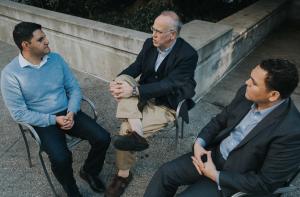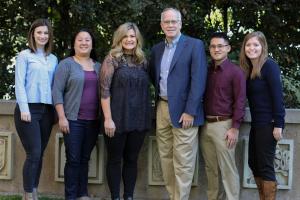According the New York Times, Google has a new secret that’s transforming their corporate life. In “O.K., Google, Take a Deep Breath,” Caitlin Kelly investigates this secret, a class called “Search Inside Yourself.”

She sets up the need for this class by pointing out the extraordinary demands and stresses for those who work at Google’s Mountain View, California campus:
Step onto Google’s campus here — with its indoor treehouse, volleyball court, apiaries, heated toilet seats and, yes, Oz-style road — and you might think you’ve just sailed over the rainbow.
But all the toys and perks belie the frenetic pace here, and many employees acknowledge that life at Google can be hard on fragile egos.
Sure, the amenities are seductive, says Blaise Pabon, an enterprise sales engineer, but “when you get to a place like this, it can tear you apart” if you don’t find a way to handle the hard-driving culture.
Faced with such ultra-pressure, hundreds of Google employees are taking a free class called “S.I.Y.”, short for “Search Inside Yourself.” Created by Chade-Meng Tan, one of Google’s early and most successful engineers, S.I.Y. trains its students in the use of “mindfulness at work.” It includes three basic steps: “attention training, self-knowledge and self-mastery, and the creation of useful mental habits.”
If you’re not a Google employee, don’t worry. Tan’s secrets will soon be published by HarperOne in his first book, Search Inside Yourself: The Unexpected Path to Achieving Success, Happiness (and World Peace). HarperOne has great hope for this book’s success:
“As technology pushes us faster, we have to adapt to new ways of doing business in this new millennium,” says Mark Tauber, senior vice president and publisher at HarperOne. “We believe that Meng’s book lays the groundwork for a new national conversation about work and what work means to us.”
Google employees speak appreciatively of the impact of S.I.Y. on their lives and work:
One exercise asks everyone to name, and share with a partner, three core values. “It centers you,” one man says afterward. “You can go through life forgetting what they are.”
Johanna Sistek, a trademark lawyer, says the emotional skills she refined in the class help her focus on her many tasks, despite a fire hose of professional demands. Like most of her colleagues, she still faces “instant deadlines” but says they no longer freak her out.
S.I.Y. doesn’t just deal with emotions and lofty ideals. It gets down to the nitty-gritty, with recommendations for e-mailing:
Can S.I.Y. translate to other companies and corporate cultures? One of its tenets is mindful e-mailing. Mr. Tan says it’s too easy to focus on the message we’re sending, and not on its recipients and the possible impact on them. When recipients don’t know the intent behind the e-mail — as is often the case — they tend to assume the worst, like anger or frustration on the sender’s part. “We frequently get offended or frightened by e-mails that were never intended to offend or frighten,” Mr. Tan writes in his book. “If we are emotionally unskillful, then we react with offense or fear, and then all hell breaks loose.”
As I read Caitlyn Kelly’s article, I was struck by how much workers, even the highly driven and successful workers of Google, desperately need to find meaning in their lives and work. S.I.Y. encourages them to find this meaning in themselves, which may or may not be the best way to do it. But at least this class provides people with an opportunity to slow down and think about their work, their lives, and themselves. One does not have to buy into the Buddhist dimensions of mindfulness to recognize the need for harried, hassled, hurried workers to take time to stop, rest, think, and feel, to pay attention to the people they’re working with and not just the tasks, to reflect on core values, and so forth. As a Christian, I find myself challenged and intrigued by the example of S.I.Y. to consider what Christian faith and fellowship might have to offer to workers who are looking for meaning, balance, rest, and wholeness in life. If indeed Tan’s book provokes, a “new national conversation about work and what work means to us,” how will Christians contribute to the dialogue?











